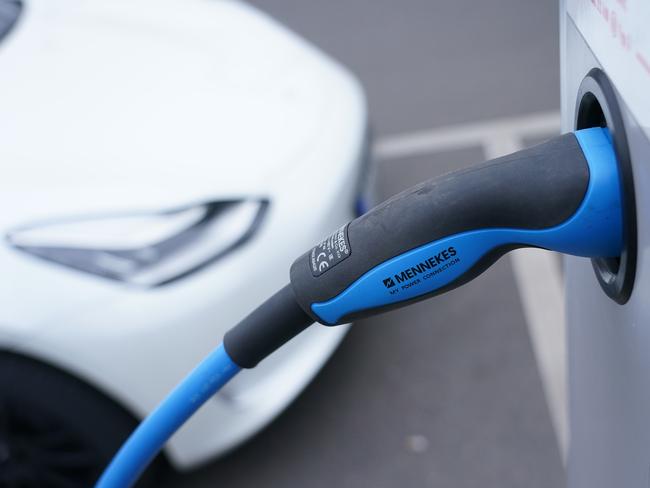Deloitte Access Economics study finds Australia can save half a trillion dollars by moving to electric cars
The electric vehicle boom will not only cut greenhouse gas emissions it will save Australia big bucks, a new study found.
Environment
Don't miss out on the headlines from Environment. Followed categories will be added to My News.
Exclusive: Australia could save almost half a trillion dollars in costs associated with pollution, greenhouse gas emissions and noise if it moved to 100 per cent electric vehicles over the next 15 years, a new report has found.
The study by accounting giant Deloitte Access Economics has attempted to quantify the costs associated with regular patrol and diesel powered vehicles — such as increased respiratory disease from pollution or the economic cost of carbon emissions — and measure it against the uptake of electric cars, buses and trucks.
The research, commissioned by the Australian Conservation Foundation, projected a total cost of $864.9 billion from 2022 to 2050, comprising $488 billion in costs from air pollution, $205 billion from greenhouse emissions, $95 billion from noise and $76 billion from water pollution.
Under the most bullish scenario, of 100 per cent electric vehicles by 2035, it predicted savings of $492 billion.

Under the second most aggressive scenario, in which all states adopt NSW’s target of all government cars and buses to be electric by 2030 and with an overall net zero target of 2045, the savings would be $335 billion.
Yet even under current federal and state government policies and targets for emissions reductions there would still be a projected saving of $232 billion.
“Transport is a significant contributor to Australia’s greenhouse gas emissions, and we’re now at a real inflection point where we can realistically look at the benefits from a fast and complete transition to EVs in this country,” Deloitte partner and report author Dr Eamon McGinn said.
“The potential benefits for our economy of the market-led EV solution, in terms of less greenhouse gas emissions, less air and water pollution, and less vehicle noise are truly staggering – almost $500 billion over the next 30 years.”

The uptake of electric vehicles has been a political lightning rod in Australia ever since the 2019 election campaign when then-opposition leader Bill Shorten announced a policy to make half of all new cars electric by 2030 — which Labor struggled to cost.
Analysis by News Corp at the time revealed the target could blow a $1 billion-a year hole in road funding within a decade — and five times that by 2039 — because of the shortfall in fuel excise revenue that would create.
Tellingly, the Deloitte analysis confirms this prospect and says it is a “critical” problem that needs to be addressed.
“Over recent years, the uptake of fuel-efficient vehicles has driven a rapid and terminal decline in fuel excise revenue – currently making up a major source of funding for our roads,” the report states.
“With EVs set to become a ‘dealership mainstay’ over the next decade, this will result in less money to pay for transport investment. The need for Australian governments to reform funding models for transport infrastructure, particularly for ZEVs (zero emission vehicles), is therefore critical.”

However while it would certainly hit the Budget bottom line, the economic benefits would far outweigh the costs, according to the latest analysis.
“If Australian leaders are looking for ways to cut emissions this decade and are serious about reaching net zero by 2050 then setting strong policy on electric vehicles is a vital and practical solution,” ACF Economy manager Matt Rose said.
“Australia is getting left behind when it comes to electric vehicles and it makes no sense when there are obvious savings to be made.”
Nigel Morris has become hooked on his electric Harley Davidson after first trying an electric motorbike in the US 20 years ago.
“Compared to my last petrol bike it saves my around $2000 per year in fuel and maintenance costs so although it’s more upfront the savings come pretty quickly,” he said.

“I also love that it has no noise, no heat and no vibration — but fat squid loads of torque!”
Deloitte also broke down costs for four urban electorates, one in each of the major eastern states.
It found costs avoided in the division of North Sydney would range from $2.3 billion to $4.8 billion. In Higgins, in Melbourne’s inner south east, it would save $1.9 billion to $4 billion.
In Brisbane’s outer metropolitan seat of Ryan $2.6 billion to $5.6 billion could be saved and in the rural/semirural seat of Mayo in SA $600 million to $1.3 billion in costs could be avoided.



